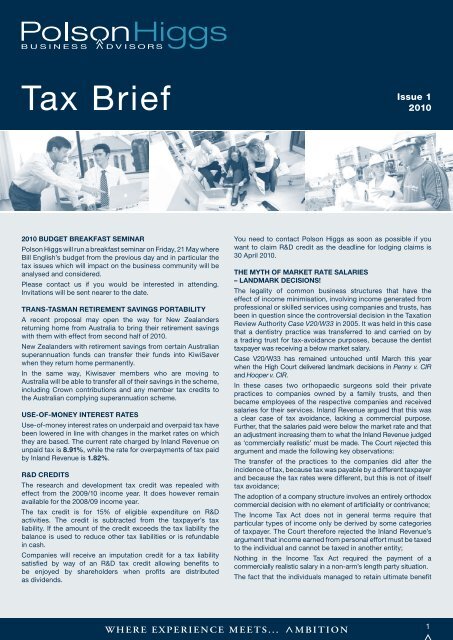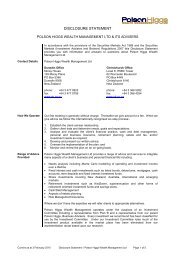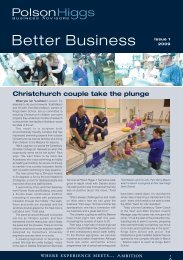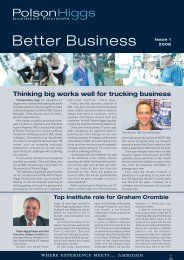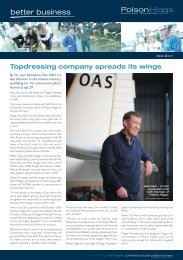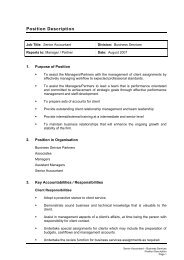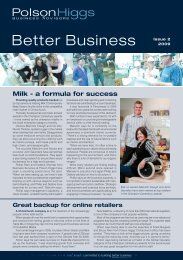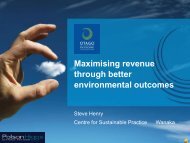Tax Brief - Polson Higgs
Tax Brief - Polson Higgs
Tax Brief - Polson Higgs
- No tags were found...
Create successful ePaper yourself
Turn your PDF publications into a flip-book with our unique Google optimized e-Paper software.
<strong>Tax</strong> <strong>Brief</strong>Issue 120102010 Budget Breakfast Seminar<strong>Polson</strong> <strong>Higgs</strong> will run a breakfast seminar on Friday, 21 May whereBill English’s budget from the previous day and in particular thetax issues which will impact on the business community will beanalysed and considered.Please contact us if you would be interested in attending.Invitations will be sent nearer to the date.Trans-Tasman retirement savings portabilityA recent proposal may open the way for New Zealandersreturning home from Australia to bring their retirement savingswith them with effect from second half of 2010.New Zealanders with retirement savings from certain Australiansuperannuation funds can transfer their funds into KiwiSaverwhen they return home permanently.In the same way, Kiwisaver members who are moving toAustralia will be able to transfer all of their savings in the scheme,including Crown contributions and any member tax credits tothe Australian complying superannuation scheme.Use-of-Money Interest RatesUse-of-money interest rates on underpaid and overpaid tax havebeen lowered in line with changes in the market rates on whichthey are based. The current rate charged by Inland Revenue onunpaid tax is 8.91%, while the rate for overpayments of tax paidby Inland Revenue is 1.82%.R&D CreditsThe research and development tax credit was repealed witheffect from the 2009/10 income year. It does however remainavailable for the 2008/09 income year.The tax credit is for 15% of eligible expenditure on R&Dactivities. The credit is subtracted from the taxpayer’s taxliability. If the amount of the credit exceeds the tax liability thebalance is used to reduce other tax liabilities or is refundablein cash.Companies will receive an imputation credit for a tax liabilitysatisfied by way of an R&D tax credit allowing benefits tobe enjoyed by shareholders when profits are distributedas dividends.You need to contact <strong>Polson</strong> <strong>Higgs</strong> as soon as possible if youwant to claim R&D credit as the deadline for lodging claims is30 April 2010.The Myth of Market Rate Salaries– landmark decisions!The legality of common business structures that have theeffect of income minimisation, involving income generated fromprofessional or skilled services using companies and trusts, hasbeen in question since the controversial decision in the <strong>Tax</strong>ationReview Authority Case V20/W33 in 2005. It was held in this casethat a dentistry practice was transferred to and carried on bya trading trust for tax-avoidance purposes, because the dentisttaxpayer was receiving a below market salary.Case V20/W33 has remained untouched until March this yearwhen the High Court delivered landmark decisions in Penny v. CIRand Hooper v. CIR.In these cases two orthopaedic surgeons sold their privatepractices to companies owned by a family trusts, and thenbecame employees of the respective companies and receivedsalaries for their services. Inland Revenue argued that this wasa clear case of tax avoidance, lacking a commercial purpose.Further, that the salaries paid were below the market rate and thatan adjustment increasing them to what the Inland Revenue judgedas ‘commercially realistic’ must be made. The Court rejected thisargument and made the following key observations:The transfer of the practices to the companies did alter theincidence of tax, because tax was payable by a different taxpayerand because the tax rates were different, but this is not of itselftax avoidance;The adoption of a company structure involves an entirely orthodoxcommercial decision with no element of artificiality or contrivance;The Income <strong>Tax</strong> Act does not in general terms require thatparticular types of income only be derived by some categoriesof taxpayer. The Court therefore rejected the Inland Revenue’sargument that income earned from personal effort must be taxedto the individual and cannot be taxed in another entity;Nothing in the Income <strong>Tax</strong> Act required the payment of acommercially realistic salary in a non-arm’s length party situation.The fact that the individuals managed to retain ultimate benefitWHERE EXPERIENCE MEETS...MBITION1
of the funds earned via their companies and received via theirtrusts was not an indication of tax avoidance.While the outcome of Penny and Hooper is welcomed, it couldstill prove to be only a temporary win as the Inland Revenue hasfiled a notice of appeal. However the decision of the Court ofAppeal will be at least some months away. In the meantime theoutcome remains uncertain and we recommend discussing thiswith your <strong>Polson</strong> <strong>Higgs</strong> tax advisor.<strong>Tax</strong> changes affect associated person rulesAmendments to tax legislation have resulted in major tax changeswhich will impact on future property purchases by propertydevelopers and dealers as well as builders starting construction,together with associated entities.These changes widen the tax base and are aimed at those whoare associated with people or entities in the business of building,or dealing in, or developing land. The effect of this extendeddefinition greatly restricts the ability for a builder, developeror dealer to hold property as a tax free capital investment inanother entity. There will now be many more taxpayers tainted byassociation, resulting in investment properties acquired by thembeing subject to tax on profit when sold.If a taxpayer is associated with a property developer, dealer orbuilder and disposes of their investment property within 10 years,they may now be exposed to tax on any profit that might havebeen considered a capital gain previously.Note the following key points:<strong>Tax</strong> law changes will affect property transactions that haveoccurred since 6 October 2009.»» In some circumstances, the changes will affect land whichis already held as a capital investment where improvementshave been made after that date.»» In most cases we believe that the existing structures you mayhave are unlikely to provide adequate protection from the taxconsequences of these changes.»» The changes to the definition of associated persons areextremely wide and it will become much more difficult todesign an ownership structure that prevents investmentproperties being tainted.»» You should take greater care when structuring future propertytransactions and seek advice before undertaking anyproperty transaction.To ensure you understand the impact of these changes in managingyour tax exposure, contact your <strong>Polson</strong> <strong>Higgs</strong> adviser to discussyour situation.the property back to themselves constitutes tax avoidance. Thisis because they are claiming tax deductions for the property thatwould otherwise have been considered to be private expensesthat are not tax deductible.This view has recently been confirmed by the TRA in CaseZ20. In that case, a taxpayer entered into an arrangement byrenting her residential home from a LAQC in which she was thesole shareholder. This generated tax losses to the LAQC, as alandlord, which were passed on to the shareholder to reduce herpersonal taxable income.The TRA decision emphasized the need to look beyond legalform and consider the economic substance of an arrangementto determine whether it constitutes tax avoidance. TRA alsocommented that the taxpayer’s arrangement was not commerciallyrealistic and involved artificial pretences resulting in the taxpayer‘manufacturing an artificial business operation’. Some of thefactors that influenced this decision were:»» No written tenancy agreement»»»»»»No bond was ever paidNo rent increase or rent reviewTransactions entered into were recorded by book entry onlyIf you are currently operating a similar structure we are able toprovide advice to minimise the risk of the structure coming withinthe boundaries of tax avoidance.Selling Property Purchased “Off the Plan”The Inland Revenue Department has recently targeted the profitson the sale of properties that are resold before the purchasecontract is settled. A booklet recently published circulated by theInland Revenue on the issue states:“Some people mistakenly believe that because their names do notappear on titles there is no need to declare these sales”. It goeson to say that, “With few exceptions, these sorts of transactionsare taxable in the same way as other property transactions.”One of the determining factors is the taxpayer’s intention at thetime of acquiring the property. The Inland Revenue states that,‘With interests in property sold prior to a contract becomingunconditional, we will presume an intention of sale.”The reality however is not that simple. Whether such sales aretaxable or not will depend on a number of factors. In our view theIRD’s booklet could be misleading and could lead to taxpayerspaying tax on sales where they are not required to under thelegislation. We recommend you seek our advice before assumingsuch sales are taxable.Sale of private homes to LAQCs can be taxavoidance – TRA Case Z20It has been a long standing view of the Inland Revenue that peopleselling their own or family homes into an LAQC and then rentingFOR FURTHER INFORMATION PLESE CONTACT:DUNEDIN PO Box 5346, Moray House, 139 Moray Place, Dunedin 9058, New ZealandT 03 477 9923 F 03 477 9795 W www.ph.co.nzCHRISTCHURCH PO Box 4449, HSBC Tower, 62 Worcestor Boulevard, Christchurch 8140, New ZealandT 03 366 5282 F 03 366 4254 W www.ph.co.nzIf you wish to receive future editions of “<strong>Tax</strong> <strong>Brief</strong>” by email, please email us at info@ph.co.nz with your contact details.2This information has been prepared by <strong>Polson</strong> <strong>Higgs</strong> as a service to your clients. It is intended to highlight recent developments and issues and shouldnot be used as a basis for making decisions. We recommend you seek professional advice from us before taking action on any specific issue.


